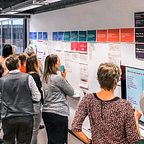Weeknotes 1: Kick-starting the work
22 March 2019, Written by Sophie Dennis, Service Design Lead, NHS Digital
The strategic Service Design for Digital Urgent and Emergency Care is a 6-month project to identify where digital has the potential to make the most impact across urgent and emergency care, using a human-centred design approach.
Getting started
We’ve had a very productive kick-off sprint with our partners FutureGov. The next 6 weeks are all about research and engagement with staff and patients. As well as mapping what we already know about people’s end to end journeys from existing research and data.
We’ve decided to focus our patient and staff engagement in three locations:
- Tower Hamlets in East London
- South Yorkshire around Doncaster
- North West Somerset (Exmoor/Minehead)
These should give us a spread of:
- geography — urban, suburban, remote rural
- service models — co-location of services, areas with an established Integrated Care System in place, places which were part of the previous Vanguard initiative
- digital maturity — places taking part in Global Digital Exemplar programme, the maturity of Local Health and Care Record (LHCRE)
All of these locations also have relatively high levels of health inequalities.
What we’ll be doing
Within each location we’ll be visiting a range of care settings, from GP practices to major A&E departments, observing how care is delivered and talking to patients and staff about their experiences. If you work in one of those service areas and could help with arranging a visit, please get in touch with Rich Cassidy at FutureGov for further information.
We’ll also be doing in-depth reflective interviews with patients in their own homes. We’re focusing on four main patient groups:
- “mainstream” low-complexity adults with an unexpected illness or injury
- parents of young children
- people seeking help with a mental health problem
- elderly/vulnerable adults with multiple conditions and their carers
We’ll do around six interviews with people from each group
There are, of course, other groups we could have included. In particular, adults and children with long-term conditions, like COPD, and people with learning difficulties. They also need the care to adapt to their circumstances and do not have to constantly repeat that information for each new person they encounter.
For now, we’ve decided not to expand the in-depth research to cover these. But we would be interested in speaking to people with expertise with those groups, so we can capture those issues in our wider findings. We can then determine if we need to do a deep-dive with these groups in future.
Keep in touch
Get in touch with Sophie Dennis or Joanna Choukeir if you’d like to chat through any of the work.
